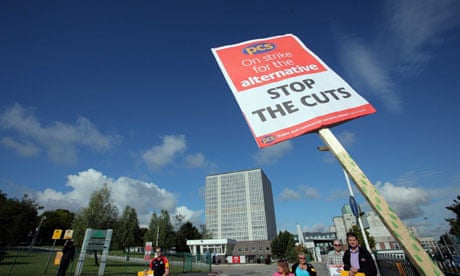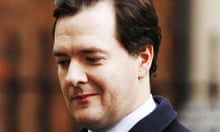George Osborne will announce plans to pay lower salaries to public sector workers in poorer parts of the country in his budget next week.
The chancellor will argue that public sector pay should mimic the private sector and be more reflective of local economies. He intends to start the process in three Whitehall departments in the coming financial year, as part of a phased introduction.
Critics say the move will entrench economic divisions between north and south and depress regions of the country already struggling in the economic downturn.
It has not yet been decided if localised pay will apply only to new staff or to existing staff as well, but it was being stressed that no current employee would suffer a pay cut. Instead pay levels will gradually be adjusted to take account of costs, leading to larger pay rises in the south-east where some labour shortages exist.
The plans emerged as the four top figures in the budget discussions spoke on the phone in an attempt to finalise the complex Treasury package to be published on Wednesday. Much of the discussion focused on the concessions being sought by the Liberal Democrats in return for agreeing to a cut in the 50p top rate of income tax, as well as the timetable by which this could be achieved.
Osborne plans to make the cut in the 50p rate for those earning over £150,000 the centrepiece of the budget, and is said to have been angered by the proposal leaking out this week. The chancellor was inundated by conflicting advice from Tory MPs as to whether the decision would be a political disaster at a time of austerity.
Many Tories tried to blame Lib Dems for the leak, saying it undermined trust between the two coalition partners.
The controversy over the top rate of tax will only be deepened by the revelation that the chancellor wants to press ahead with localised public sector pay. The Treasury will announce that 140,000 posts in the public sector will be the first to be subject to the new rules.
The first posts to be considered for localised pay are the 100,000 staff in the Department for Work and Pensions; 21,000 posts in the Home Office, including Border Agency staff; and 16,000 staff in the Department for Transport, including the DVLA in Swansea.
The Treasury intends to spread the reforms beyond the civil service across the public sector in the years ahead as staff come out of the public sector pay freeze.
The department is not trying to introduce just regional pay, but local or zonal pay that might take account of, for instance, living costs in suburban Manchester as opposed to inner-city Manchester.
The Treasury regards the change as one of the most important measures it can introduce to rebalance the economy. Osborne claims the move would provide a boost to the private sector in the north and south-west, arguing that employers in these areas cannot afford to recruit staff owing to the relatively high public sector wages in cheaper areas of the country.
The risk is that localised pay will fuel a boom in the high-wage south-east and further depress the north, so entrenching economic and social divides.
The Institute for Fiscal Studies found that earnings were more than 10% higher for men and 15% for women in the public sector in Wales, Scotland and Northern Ireland.
The Treasury's own research shows that public sector pay is 40% less responsive to local costs than the private sector. The main model for local or zonal pay so far has been the courts service.
The business secretary, Vince Cable, has spoken of the practical difficulties with the scheme and urged the government to handle the issue with great care.
He said: "It isn't just the political issue that people are going to be levelled down in some of the relatively low-wage areas; I think there is this genuine problem about how you get a career progression [among] long-term civil servants if you have differential pay."
Osborne outlined the plan in the autumn statement when he said he would ask the independent public sector pay review bodies to consider how to make public sector pay more responsive to local labour markets and report back by July.
Public sector unions say national bargaining brings economies of scale to public sector pay. The NHS, for example, has 161 acute hospital trusts. Each of these, it is claimed, would have to gather labour market intelligence, draw up a negotiating position, hold a number of negotiating meetings involving senior staff, and set up new payroll systems.
The unions will be furious after they have undergone a two-year pay freeze, cuts in their pension entitlements and cuts in as many as 700,000 public sector jobs.
In a sign of the already fractious relations, it was announced yesterday that civil servants in the Public and Commercial Services Union have voted to reject the government's latest pension proposals and continue industrial action.
Osborne has noted that Labour has endorsed regional welfare caps, and believes Ed Miliband has therefore already introduced the notion of regional incomes.
The plans will add to tensions about the overall political direction of the budget. Lib Dem willingnesss to see an end to the 50p rate in the right circumstances did not lead to serious protests inside Nick Clegg's party, although the leftwing Social Liberal Forum issued a statement urging the party to stand firm.
Ed Balls, the shadow chancellor, described the runup to the budget as a shambles. He said: "The idea that, when fuel bills are going up, tax credits are being cut and families are under real pressure, his first priority is to cut taxes only for those over £150,000? That is the wrong priority. It would be completely out of touch.
"I hope even at this late stage he will change course and help families in our country. That's what we need."







Comments (…)
Sign in or create your Guardian account to join the discussion